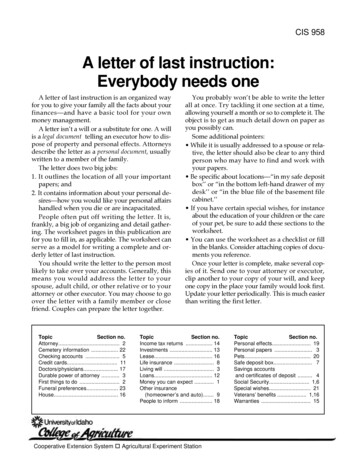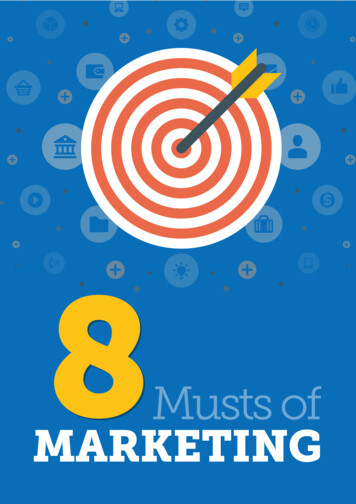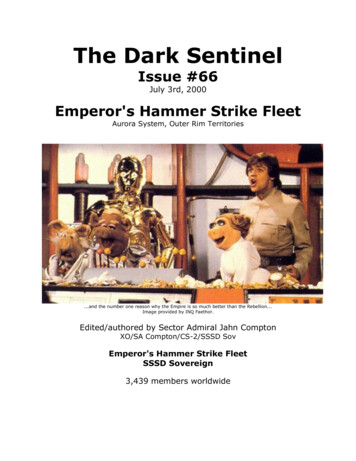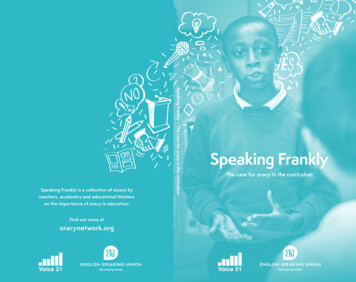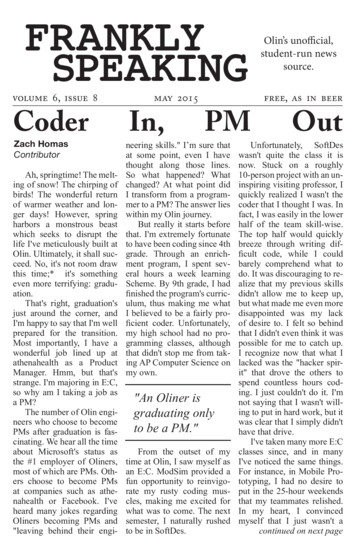
Transcription
FRANKLYSPEAKINGvolume 6, issue 8CoderZach HomasContributorAh, springtime! The melting of snow! The chirping ofbirds! The wonderful returnof warmer weather and longer days! However, springharbors a monstrous beastwhich seeks to disrupt thelife I've meticulously built atOlin. Ultimately, it shall succeed. No, it's not room drawthis time;* it's somethingeven more terrifying: graduation.That's right, graduation'sjust around the corner, andI'm happy to say that I'm wellprepared for the transition.Most importantly, I have awonderful job lined up atathenahealth as a ProductManager. Hmm, but that'sstrange. I'm majoring in E:C,so why am I taking a job asa PM?The number of Olin engineers who choose to becomePMs after graduation is fascinating. We hear all the timeabout Microsoft's status asthe #1 employer of Oliners,most of which are PMs. Others choose to become PMsat companies such as athenahealth or Facebook. I'veheard many jokes regardingOliners becoming PMs and"leaving behind their engi-May 2015In,PMneering skills." I’m sure thatat some point, even I havethought along those lines.So what happened? Whatchanged? At what point didI transform from a programmer to a PM? The answer lieswithin my Olin journey.But really it starts beforethat. I'm extremely fortunateto have been coding since 4thgrade. Through an enrichment program, I spent several hours a week learningScheme. By 9th grade, I hadfinished the program's curriculum, thus making me whatI believed to be a fairly proficient coder. Unfortunately,my high school had no programming classes, althoughthat didn't stop me from taking AP Computer Science onmy own."An Oliner isgraduating onlyto be a PM."From the outset of mytime at Olin, I saw myself asan E:C. ModSim provided afun opportunity to reinvigorate my rusty coding muscles, making me excited forwhat was to come. The nextsemester, I naturally rushedto be in SoftDes.Olin’s unofficial,student-run newssource.FREE, AS IN BEEROutUnfortunately, SoftDeswasn't quite the class it isnow. Stuck on a roughly10-person project with an uninspiring visiting professor, Iquickly realized I wasn't thecoder that I thought I was. Infact, I was easily in the lowerhalf of the team skill-wise.The top half would quicklybreeze through writing difficult code, while I couldbarely comprehend what todo. It was discouraging to realize that my previous skillsdidn't allow me to keep up,but what made me even moredisappointed was my lackof desire to. I felt so behindthat I didn't even think it waspossible for me to catch up.I recognize now that what Ilacked was the "hacker spirit" that drove the others tospend countless hours coding. I just couldn't do it. I'mnot saying that I wasn't willing to put in hard work, but itwas clear that I simply didn'thave that drive.I've taken many more E:Cclasses since, and in manyI've noticed the same things.For instance, in Mobile Prototyping, I had no desire toput in the 25-hour weekendsthat my teammates relished.In my heart, I convincedmyself that I just wasn't acontinued on next page
coder. It wasn't meant forme. Sure, I was pretty goodat it, and sure, I loved a lot ofmy classes and learned a tonin almost all of them. I didn'tregret being an E:C, but justlooking around at my friendsand fellow E:C’s, I knewI wasn't like them. I didn'thave their hacker spirit.My beliefs were cemented by my two developer internships as a rising sophomore and rising junior. Onesummer, I worked for a largeconsulting company doingapplicationdevelopment,and the other I worked at astartup doing website development. What both had incommon was a rather boringand unsatisfying daily worklife. It's not that I didn't enjoy coding. I just didn't enjoycoding every day for eighthours in a row with little else.It clearly wasn't the careerfor me.And then I took UOCD.To this day, UOCD is my favorite Olin class and easilythe most influential. Actingas team leader, every day Iused skills that I did not evenknow I had. Presentation, organization, and design wereall things I had done before,but never together like this. Itwas a challenging experiencein many regards, but in theend, I understood that thesewere skills I could really use.And that's when it clicked - Icould be a Product Manager.Despite this revelation,the next semester I appliedto numerous developmentinternships, none of whichcame through. I began to feelthat I didn't fit into a "true"programming job. But then,one last opportunity appeared. Strangely, it was aninterview for PM internshipat athenahealth, even thoughI hadn't applied for one. As itturns out, my recruiter sawmy resume and submitted itas a PM candidate based onmy experience in UOCD.That was probably one of theluckiest things to ever happen to me.The interview was extremely successful, with myUOCD experiences provinginvaluable, and I got the internship. As for the internship itself? Overall, it was afantastic experience. Sure, Imay not have used all of thetechnical skills I've gained atOlin, but I did use all of thedesign, presentation, and organizational skills that Olinhelped foster. It was very sat-isfying, and it made me realize that I could still own andshape a product without coding it. And most importantly,it was both challenging andfun. At the end, I was offereda full-time position, which Igladly accepted.And now, almost a yearlater, I'm about to start work.In just one month, I will bea PM. And although it's notwhat I expected to be whenI started Olin, I truly thankOlin for enabling me to discover skills I didn't knowI had and helping me findwhere I think I belong in theworld. As I've learned, yourcollege experience and passions don't always lead whereyou expect them to. Discoverthe skills you have and enjoyusing. Use them and do coolthings, even if it's not whatyou originally set out to do.And the next time you hearthat an Oliner is graduating"only to go off and be a PM,"understand that Olin doesa lot more than just teachengineering. It gives us theskills we need for the future.And I don't think that wanting to use those skills is verystrange at all.*See "Mending a BrokenRoom Draw," April 2014This Year's ProjectsBrainstorm with BOWDiscussion on DiversityFixing Go BikesEasy Welding10am to 5pm, Olin CollegeBeekeepingOrigamiSERV Kick BallSuper-Extra ProjectFor schedule and full description of projects, go toour regularly updated website: buildday.github.io
WeCouldVictoria PrestonContributor on behalf ofthe Honor BoardEvery year at Olin, agroup of 80 people sign adocument that is hung bythe Wooden Waterfall. Andevery year at Olin there is atleast one Town Hall to talkabout what’s on that piece ofpaper. And, inevitably, everyyear at Olin what is writtenis used as a means to addressconcerns or wrongs that occur on campus - and very seldom used to point out whatis right."If my definition of greatnessdoesn't align withthe Honor Code,am I wrong?"Can a list of five valuesreally capture what we wantthis community to be, andshould they be used to frameor limit what can be talkedabout on campus? Some argue that yes, we absolutelyneed an Honor Code. It givesus a common language totalk about our community, itcan reflect perhaps not whowe are now but who we wantto be, and it sets an expectation - as a member of OlinCollege, I will be great. But‘greatness’ has such a widevariety of meanings to thestudents at Olin. If my definition of greatness doesn’talign with the Honor Code’s,am I wrong?BeThere is no safe venue forstudents to actively choosenot to sign the Honor Code.There is no reaffirming ceremony, the Town Hall votehas slipped into symbolism, and when the questionof whether or not the HonorCode should be kept comesup there are still those ofus that laugh when the fewvotes of dissent trickle in.Why are you laughing?Often, the alternative tothe Honor Code is cited tobe a rule-based system. A listof conduct, rather than a toyour-interpretation set of values. I propose a thought experiment: what if the valueswere replaced with.nothing? What would happen ifsuddenly there were no morevalues, but the Honor BoardHearing Panel Process wasstill in place? Perhaps campus would erupt in chaos I tend to believe that thingswould likely continue theway they were.From the Honor Board’sperspective, having the values is a neat and tidy way ofhandling cases and administering a report procedure. Butthere have been times in history where a report doesn’tnecessarily fit into a tidy value - its more messy than that,just as real life always is. Byhaving a listed set of values,perhaps we are limiting whatwe see as ‘honor-board-able’actions thus leading to thisperpetual state of minimalmediation through the procedure process.Simply signing a pieceof paper does not hold usGreataccountable to ‘follow theHonor Code,’ though it issupposed to lend an air ofpromise to try to ‘be great.’Voting to keep the HonorCode at every Town Halldoesn’t necessarily makeus reflect on why we feelthat way. Simply institutingan Honor Code does not fixor regulate our campus climate, but perhaps that isn’tthe point of the Honor Code.Perhaps the focus on usingit as a governing, behaviorcontrolling document isn’thow we should be thinkingabout it. Rather, perhaps it isa platform for discussing ourcampus climate. To reflect onpersonal values, on personaldefinitions of ‘greatness.’ Toshare with our communitywhat makes us ‘great.’"There is no safevenue for students to activelychoose not tosign the HonorCode."The Honor Code is notthe end-all be-all. We havethe power to change, shapeit, demolish it, ignore it, liveit. What is the right thing todo?To see the full Honor Code, (yes, there'smore than the paper yousigned), go to: honorboard.olin.edu
TheSuperpowerMikhaela Dietch, SusanGrimshaw, and HannahTwigg-SmithContributorsThe most difficult part ofacclimating to my life at Olinhas been the lack of open andpotent communion for ideas,skills, abilities, and thoughts.We are a highly resourced,intelligent, and multi-facetedgroup, yet our pathways forcreating and sharing with oneanother are impeded by someinvisible barrier.“Why?”I’ve been asking thisquestions repeatedly formonths now, each day revealing new insights, butthe most powerful shift inmy understanding has beenthat I am not the only onewho feels this way. In fact,so many of us desire to havenew channels of expression,new spaces for creation, andmost importantly new waysto share and learn with eachother. Or, shall we say, moreskillshare.There ought to be a stronger medium for skillshare tooccur. We are seeing shiftstowards this (SLAC perhapsbeing the godfather of thiscultural evolution) but if thisis what we want, all the softmummers must coalesce intosomething real.In DREAM (DesigningResources for Empowermentand Making) we have beenexploring what these real solutions might look like. Ournebulous thoughts have condensed into a plan.With our final project wewant to strengthen skillshareculture on campus, by creating means for peer-to-peerteaching. We plan to createnew student positions for students who will operate in allaspects of campus learning,to facilitate these interactions beneath the umbrella ofthe library. The library is anideal place, as it is morphinginto the hub for resources,community, and change. Thisnew role belongs in such acontext where the structureand culture we wish to inciteare already beginning to exist."Or shall we say,more skillshare."These student facilitatorswould be in charge of maintaining a database of eachstudent’s skills or ‘superpowers’ that they are willingto teach other students andmatching student-learners tostudent-teachers, as well asserving to facilitate interactions in either capacity. Students would have access toboth the student facilitatorsand the database and coulduse either/both depending ontheir need. More loosely, thestudent facilitator’s purposeis to draw out the ‘superpowers’ of the Olin community,create channels for peopleto connect with one another,create structure and space forskillshare to happen, protectcontributing students fromburnout, and form a healthyatmosphere of Make\Share.Ultimately, the student facili-Projecttators would help in slowlyshifting our culture towardsstronger communion of ideasand a more investigative andcreative Olin.The axial goals of thestudent facilitators are to promote a culture that supportspeer-to-peer teaching, andstrengthen our community insupporting and valuing oneanother for our individual interests and skills. This project, and more importantlyculture shift, is intended tospecifically empower learners to feel more comfortableasking for help and guidance,and to generally empowereveryone at Olin by acknowledging their superpowers,obvious and otherwise. In essence: everyone should feellike they have something tocontribute, because they do.It can be intimidating tobe around people who knowmore than you because youfeel that you should knowthose things as well. We areall here to learn more thanjust what exists within ourmajors, or at least we shouldbe. We all have so much tooffer the community. Whether your skill is being exceptionally knowledgeableabout mechanics, nailing aninterview, or drawing unicorns, I can guarantee thatthere is someone at Olin whowants to learn it.If you are interested inthis project and have ideas,feedback for us, or want tohelp out, please email us atolinskillshare@gmail.com.We’d love to hear it, and getyou involved!
Service Updates at Olinin our cities by recoveringexcess food and selling it atlow-cost.Doctors Without Borders: Hunger Banquet to promoteOlin Communitydiscussion around hungerThe 9,719.62 from the worldwideSERV auction has been of- The Food Recovery Netficially donated to Doctors work: Led by MackenzieWithout Borders to help Frackleton with GROWthem deliver emergencymedical aid to those in con- Partnering with the Food Reflict, epidemics, and disasters covery Network to donate- such as the most recent Ne- uneaten, prepared food fromthe dining hall to the Salvapal earthquake.tion Army to combat bothE-Disco: Led by Toni, was
interview for PM internship at athenahealth, even though I hadn't applied for one. As it turns out, my recruiter saw my resume and submitted it as a PM candidate based on my experience in UOCD. That was probably one of the luckiest things to ever hap-pen to me. The interview was ex-tremely successful, with my UOCD experiences proving
